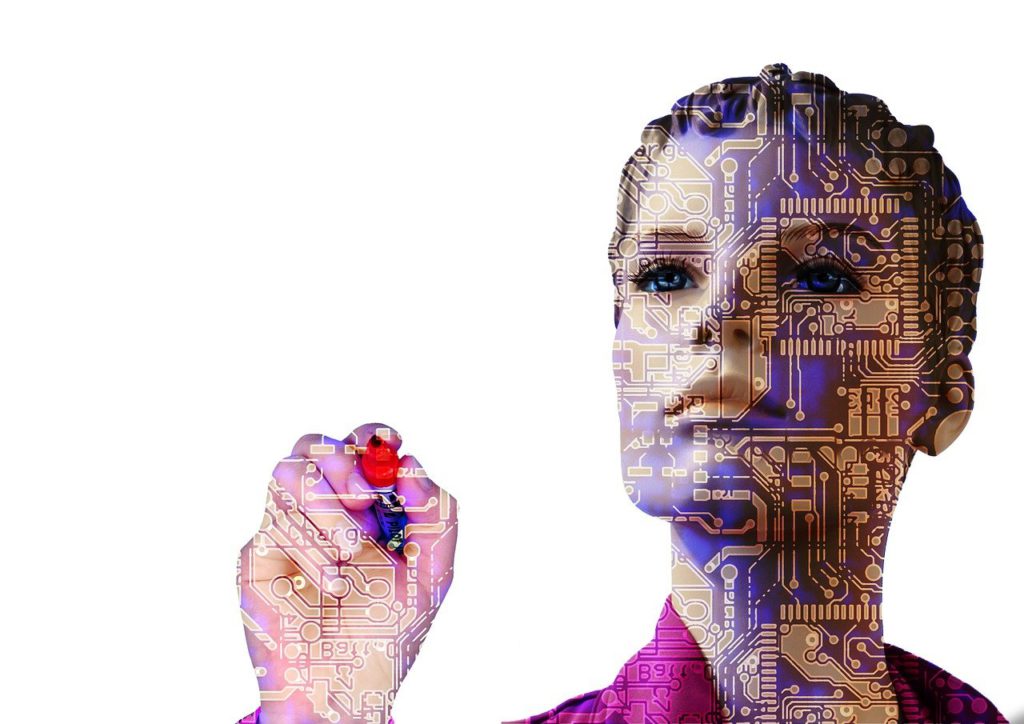Artificial Intelligence or AI is a crucial and rapidly advancing component of the tech industry. AI refers to the simulation of human intelligence processes by machines, particularly computer systems. It involves creating systems that can perform tasks that typically require human intelligence, such as visual perception, speech recognition, decision-making, language translation, and problem-solving.
AI Supporting Industries for Innovation and Growth
The tech industry encompasses a wide range of technologies, products, and services related to computing, electronics, software, and digital advancements. AI is a significant subset of the tech industry because it involves the development and application of sophisticated algorithms and technologies to enable machines to mimic cognitive functions.
AI technologies include machine learning, deep learning, natural language processing, computer vision, robotics, and more. These technologies have numerous applications across various sectors within the tech industry, such as software development, data analytics, automation, and the creation of intelligent systems. It also has a supporting role in other industries where work processes can be optimised for better performance, accuracy, and cost-saving.
Growth of Artificial Intelligence (AI)
The exponential growth of artificial intelligence (AI) technology has emerged as a transformative force across the global landscape, and Singapore is at the forefront of embracing this technological revolution.
In recent years, AI has seen remarkable growth and adoption in various sectors of the Singaporean economy, propelling the nation toward a future characterised by innovation, efficiency, and enhanced decision-making. In conjunction with the nation’s Smart Nation plan, the Singapore government has outlined a National AI Strategy that focuses on transforming seven areas – healthcare, smart estates, education, border security, logistics, finance, and government to deliver strong social and economic impact for Singapore and Singaporeans.
The growth of AI has had a transformative impact on the tech industry, leading to the development of innovative products and services that leverage AI capabilities. Companies within the tech industry are actively investing in AI research, development, and implementation to enhance their offerings and stay competitive in the rapidly evolving technological landscape.
In essence, AI is an integral and dynamic part of the tech industry, driving innovation, shaping digital transformation, and revolutionising the way technology is developed, deployed, and utilised across different sectors and domains.
How AI Transforms Industries
Artificial Intelligence (AI) serves as a transformative force across a wide spectrum of industries, revolutionising how businesses operate, make decisions, and deliver value to their customers. Its applications are diverse and continue to expand, bringing automation, optimisation, and innovation to various sectors.
In each of these industries that we have listed below, AI brings efficiency, accuracy, and innovation. Its ability to process and analyse large volumes of data, learn from patterns, and perform tasks that traditionally required human intelligence is reshaping how industries operate and unlocking new opportunities for growth and advancement. Here are some ways AI supports different industries:
Healthcare
Singapore’s healthcare AI, Synapxe, aims to achieve better control of diabetes, hypertension and high blood cholesterol, and reduce the risk of developing disease complications. SOme of AI’s functions in healthcare include assisting in diagnosing diseases, predicting patient outcomes such as the Singapore Eye Lesion Analyser (SELENA+), an AI project that can detect potential threatening eye conditions accurately and efficiently, and personalising treatment plans. Medical imaging analysis, drug discovery, and telemedicine benefit from AI’s ability to process and interpret vast amounts of medical data quickly and accurately.
Finance
There is a wide variety of uses of AI in finance. AI algorithms enable fraud detection and prevention, credit scoring, and risk assessment. Internal processes such as enhancing financial reporting, financial planning and analysis, sales and revenue forecasting, customer service, and marketing strategies. Trading algorithms use AI to analyse market trends and execute trades at optimal times. Chatbots and virtual assistants streamline customer service in the financial sector.
Manufacturing
In manufacturing, AI increases opportunities for automation throughout the entire process. AI-driven automation enhances production lines by optimising processes, predicting equipment failures, and ensuring quality control. Other benefits of using AI in this industry include more visibility and real-time analysis of the entire manufacturing environment, from supply chain to production line, preventative maintenance of equipment or machines, enhanced quality and inspection of equipment and machines, improved and faster product design process. Furthermore, robotics and machine learning contribute to autonomous manufacturing and predictive maintenance.
Retail and E-commerce
In e-commerce, AI technology uses customers’ data and past buying behaviours to power recommendation systems, personalised marketing, and supply chain optimisation. These not only lower operational costs but increase revenue due to targeted marketing. Chatbots provide real-time customer support, while AI-powered visual recognition improves product search and augmented reality enhances the shopping experience.
Transportation and Logistics
AI optimises route planning and optimisation to identify the most efficient route for logistics trucks, fleet management, and logistics operations. In the automotive sector, self-driving vehicles rely on AI for perception, decision-making, and navigation. Autonomous vehicles help reduce risks such as driver fatigue and lack of manpower and improved traffic management for better delivery planning times. These should be able to reduce overhead costs and increase productivity.
Energy and Utilities
AI aids in forecasting energy consumption, optimising power grids, and predicting equipment maintenance needs. Smart grids and IoT devices leverage AI to enhance energy efficiency. Specifically, the utility industry can gather a large number of pictures of the transmission and distribution system to create algorithms that incorporate data and offer solutions. Another example is the management of power plants where the technology can help managers balance supply and demand issues, maintain their plants, and improve safety measures.
Agriculture
When used in agriculture, AI solves many challenges and helps to diminish many disadvantages of traditional farming by analysing data from sensors, drones, and satellites to monitor crop health, predict yields, manage irrigation, monitor weather conditions, and recommend the application of fertiliser and pesticides. These functions help boost crop production and enhance profitability, enabling farmers to make better decisions at every stage of the process. Precision agriculture also benefits from AI’s ability to tailor interventions to specific field conditions.
Education
AI-driven educational platforms offer personalised learning experiences, adaptive assessments, and intelligent tutoring. For example, AI has been integrated into Singapore’s education system by using automated English marking systems for primary and secondary English language assignments such as open-ended, short-answer questions and essays; catching language errors in grammar, spelling and syntax, adaptive learning systems for mathematics to customise students’ different paces of learning and adjust their learning pathways accordingly, and AI-enabled learning companions to support holistic learning by motivating the student while he or she is doing a challenging task, encouraging reflection on the learning experience, and recommending further learning activities.
Entertainment and Media
With global digitalisation in the entertainment and media industry, companies like Netflix, Spotify, Youtube are using AI to enhance their operations. AI powers content recommendation engines, personalised streaming services, and targeted advertising by analysing user preferences, browsing history, and behaviour. Therefore, AI algorithms can suggest games, movies, TV shows, music, books, and other content that a user might like. It also contributes to video and audio analysis, enhancing content moderation and copyright protection. Since the rise of social media, producing content is rampant globally. With AI, anyone with an internet connection can get help in scriptwriting, music generation, and visual effects creation for the purpose of content generation.
Real Estate
AI assists in property valuation, predictive market analysis, and property management. Meet Elise, an AI for managing properties, helps landlords or property agents with operational processes like tracking payments, lease expiry dates, and conversations with tenants. Managing multiple properties is more manageable this way. Virtual tours and AI-powered chatbots enhance the customer experience in real estate transactions.
Marketing and Advertising
AI can be used in many parts of the marketing processes such as social listening, automation, and content generation. AI also optimises marketing campaigns through data analysis, customer segmentation, and dynamic pricing. Natural language generation creates personalised content, while sentiment analysis gauges customer opinions. These result in faster response times, improved return on investment (ROI), and increased efficiency.
Law and Legal Services
AI supports legal research, document management and automation, contract analysis, and e-discovery. Chatbots provide legal information and assistance, streamlining client interactions. These help legal workers increase productivity, have an improved access to justice, and improved client experience.
AI’s Impact on the Job Market and Workforce Development
The integration of AI technology is anticipated to significantly impact the job market in Singapore. Recently, workers in Singapore are found to be the fastest to adopt AI in the world. While certain routine tasks may be automated, AI’s augmentation of human capabilities is expected to open up new avenues for high-skilled job opportunities. This shift necessitates a dynamic approach to workforce development, which Singapore is addressing through comprehensive initiatives.
Local Workforce Preparation
Singapore is proactively equipping its workforce for the AI age through multifaceted efforts. SkillsFuture initiatives, for instance, enable individuals to acquire relevant skills through training and education. The TechSkills Accelerator (TeSA) program focuses on building a skilled workforce for the tech sector, including AI.
Singapore’s educational institutions are actively preparing the local workforce for the AI industry. Universities are offering specialised courses in AI, machine learning, and data analytics. Initiatives like SkillsFuture and the Singapore Institute of Technology (SIT) Academy are designed to upskill and reskill professionals in AI-related fields, ensuring they remain adaptable in the evolving job landscape.
Government Support and Initiatives
Recognising the strategic importance of AI, the Singapore government has undertaken a series of initiatives to foster the growth of this burgeoning industry. The AI Singapore program, launched in 2017, is a national effort that aims to cultivate AI capabilities, encourage AI adoption across industries, and promote research collaborations between academia and industry.
Additionally, the government has established partnerships with leading tech companies and academic institutions to drive research and development in AI. Funds have been allocated to AI-related projects, startups, and technology-driven enterprises, reinforcing Singapore’s position as an AI hub.
Impact of AI on Immigration and Foreign Talent
As the AI industry flourishes in Singapore, demand for AI experts and specialists grows. The government’s openness to foreign talent is evident in its various schemes, such as the Tech.Pass, ONE Pass and the Global Investor Programme, which attract skilled individuals to contribute to the AI ecosystem. This approach enriches the talent pool and bolsters the industry’s innovation and growth.
Because AI is still in the growth stage and the increase in job and business opportunities in Singapore is rampant, IASG expects more AI professionals to live long-term in Singapore in future, leading to the possibility of more AI professionals applying for Singapore PR. Due to Singapore’s new immigration policy to attract top talents globally, there might be an increase in PR approvals for highly skilled workers such as AI professionals.







